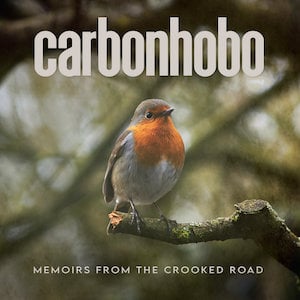
Carbonhobo – Memoirs From A Crooked Road
Merry Hell Music – 2 August 2021
Merry Hell fans will know Neil McCartney as their fiddle player, but he also has his own side project Carbonhobo and Memoirs from a Crooked Road is the debut album. Given the songs were mostly written in the 80s and 90s, in places as diverse as New York, Ireland and Thailand, it’s fair to say it’s been a long gestation.
None of his regular bandmates are present, but guests include Laura Forrest-Hay on violin, mandolinist Seanin Hawthornthwaite, Lee Goulding and Jeff Hudgins on banjo and saxophone, respectively, with son Ben on piano. It opens with the jaunty lilting sway of Chasing A Bluebird, a song about being young and foolish in love with a self-destructive roving heart that has him always looking for new conquests, but at the cost of loneliness and regret over those left behind.
The slower, bluesier 70s folk of Warm In The Bed, on the other hand, is all about contentment, lying in bed in an autumn morning with his lover (though, presumable after she’s fixed his egg and toast) reflecting on the past and dreaming of possibilities ahead. Opening and closing with the sound of a train rolling along the tracks, the fiddle and banjo-coloured bluegrassy Somewhere Down The Northern Line is another jaunty number, the lyrics consisting of just six lines, predominantly “see you soon, it’s gonna be soon”. Slowing things down, with a simple brushed snare and fiddle, Blackberries returns to the theme of a relationship, this time trying to clear his head of seemingly unfounded feelings of jealousy quite possibly after some sort of tiff. Then comes arguably the most distinctive number, the joyous Fifteen Miles To Buy Tobacco, a kind of playground number (albeit with nicotine) with its wheezing fiddle, drum thumping march beat, whistling and (as referenced in the lyrics) a melody akin to the old folk chestnut Froggy Went A Courting. Spontaneous foot-tapping and thigh-slapping are expected.
The mandolin makes its appearance on Audrey & The Old Caravan, a memory of childhood seaside holidays and romantic visions of growing up, forming a band with his sweetheart, living off the land and saving up pocket money to buy mum and dad’s caravan to set up their own home where they can share fish and chips and grow old together. As befits the whimsical narrative, the fingerpicked Slim Chance folksiness has a complementary sense of innocence.
Growing older also underpins Stranger (“there’s no denying that you get stranger as I get older but I love you”), which also sports a Ronnie Lane flavour along with Forrest-Hay’s violin, an optimistic outlook (“at the end of the road there’s a pot of gold”) and the second song to mention frying eggs while reference to Obelia (a genus of jellyfish-like invertebrates of the class Hydrozoa also known as sea fur) suggests he knows his way around a zoology textbook too.
The sole traditional number comes with the Bothy Band’s arrangement of the Irish instrumental reel The Maids Of Mitchelstown, on which he gets to showcase his fine fiddle work with what sounds like a table providing percussion. That Eastern musical spice spills over into the raga-like lurch of the spoken delivery Road To Old Siam, the album’s most ‘recent’ tune and inspired by the birth of his son in Thailand.
A co-write with Jonas Read, with whom McCartney played in the London-based 90s Irish busking outfit The Big Geraniums, The Man In The Moon & The Heron is a whimsical slice of blarney that likely owes a debt of inspiration to Lewis Carroll or Edward Lear as McCartney spins the tale of how, fishing for barnacle geese with turnips, the Moon reels in a heron who grants him the wish in exchange for a meal of filleted cod in batter as they are conversing about “travelling gypsies and solar eclipses and satellites covered in rust” before the Moon wishes to have “a heron like you for a wife!”.
It ends, vaguely back in reality, a New York basement bar to be precise, with, appropriately enough, Hudgins on the neon and rain-washed streets vibe of saxophone for the lazing, piano-backed John Coltrane On Bleeker Street, capturing broken dreams, melancholy and hope for a better dawn on a lyrics that manages to include references to Halloween skeletons, Hitler, a squirrel, Napolian (sic), Elvis, cola, burger fries, evangelists, free enterprise and “popular ontology” while also including a line about being as “angry as a butterfly”.
It ends, along with the persistent bird cries, with what sounds like a kora backing to the atmospheric six-minute Seagull, a predominantly instrumental track that, in its four lines of lyrics, suggests a sense of unfettered freedom in “We’ve got no money/Nothing but an empty sky” before quietly fading away along with the wash of the waves and what might be described as a muted echo of the intro to The Who’s Baba O’Reilly. A far cry from the often politically charged tub-thumping anthems of his day job, it gently grows on you the more you hear it, laying down a carbon footprint that’s well worth walking in.

